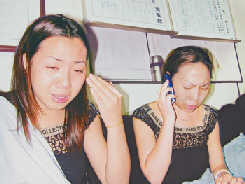Taiwan leader slammed for attitude
( 2003-08-29 07:09) (China Daily)
Taiwan leader Chen Shui-bian came under heavy fire Thursday for his calculated politicizing of the tragic deaths of six smuggled mainland women, by trying to shift the blame onto the mainland.

Two Chinese mainland stowaways weep after being arrested by the Taiwan Coast Guard at Taichung harbour August 26, 2003. At least six illegal mainland immigrants drowned at sea off Taiwan after human smugglers threw them and 15 others overboard to lighten their load so they could speed away from authorities. [HK Edition] |
"With most of the people on the Taiwan side of the Straits lamenting the drowning of the women, it is shameful that Chen should hold an indifferent attitude toward the tragedy and not offer the least bit of sympathy," said Li Jiaquan, a senior researcher with the Institute of Taiwan Studies under the Chinese Academy of Social Sciences.
"Even worse, he has tried to take advantage of the incident to blame the mainland and advocate discrimination and hostility towards the mainland among the Taiwanese people."
The researcher made the remarks in response to Chen's absurd comments on the monstrous murders of the women, who were thrown into the sea by Taiwanese human traffickers on Tuesday.
At the approach of a patrol boat, a total of 26 mainland women were dumped overboard by people smugglers, known as "snakehead" gangs, near Tunghsiao on the island's west coast.
Seventeen of the women were later rescued but three are still missing.
These women, from Jiangsu, Zhejiang, Hubei, Sichuan and Jilin provinces, between 21 and 28 years old, were smuggled to the island from Fuzhou, capital city of neighbouring Fujian Province.
In stark contrast with the Taiwanese public and Beijing's condemnation of the atrocity, Chen reportedly said the authorities in Beijing should shoulder most of the responsibility.
The women were "using their feet to vote" against the mainland government by risking their lives to get to Taiwan solely because of their dissatisfaction with their homeland and the mainland authorities, the leader was quoted as saying.
He also urged Beijing to pay more attention to protecting human lives and the property of its people rather than "opposing Taiwan's international participation," according to local media reports.
Chen's cold-hearted attitude also drew much criticism from thousands of netizens, who posted strong-worded online articles about the incident.
Even the United Daily News, a mass-market Taiwanese newspaper, reproached Chen for politicizing a human rights issue.
"Using Chen's logic, don't Taiwanese business people also cast a vote of non-confidence against him by living and working on the mainland?" it asked.
Li said Chen's irresponsible move completely exposed his deep-rooted pro-independence mentality, which contributed to his failure to understand the true nature of cross-Straits human smuggling.
"We have to admit that human trafficking has been rampant between Taiwan and the mainland but the main cause for such crimes is Chen's seriously flawed mainland policy," he said.
Although Chen has been in office for more than three years, he has failed to take any concrete steps to lift Taipei's decades-old ban on the three direct links -- trade, transport and postal services across the Straits.
Meanwhile, the leader of the pro-independence Democratic Progressive Party, which has enshrined formal independence of the island in its party platform, has been promoting separatist attempts to strain bilateral ties.
"It is precisely the absence of normal cross-Straits exchanges that gives human smugglers the chance to profit from people smuggling," Li said.
Hundreds of mainland women are lured to Taiwan every year by promises of high-paying jobs.
In the latest development, Taiwanese media reports said family members of each of the six dead women could get a maximum compensation of NT$1.4 million (US$399,000).
The four Taiwanese smugglers -- Yeh Tien-sheng, Tseng Chung-ming, Wang Chung-hsing and Ko Ching-song -- are being held at the Prosecutors' Office in Miaoli in Taiwan. Prosecutors said they could face murder charges.
|

